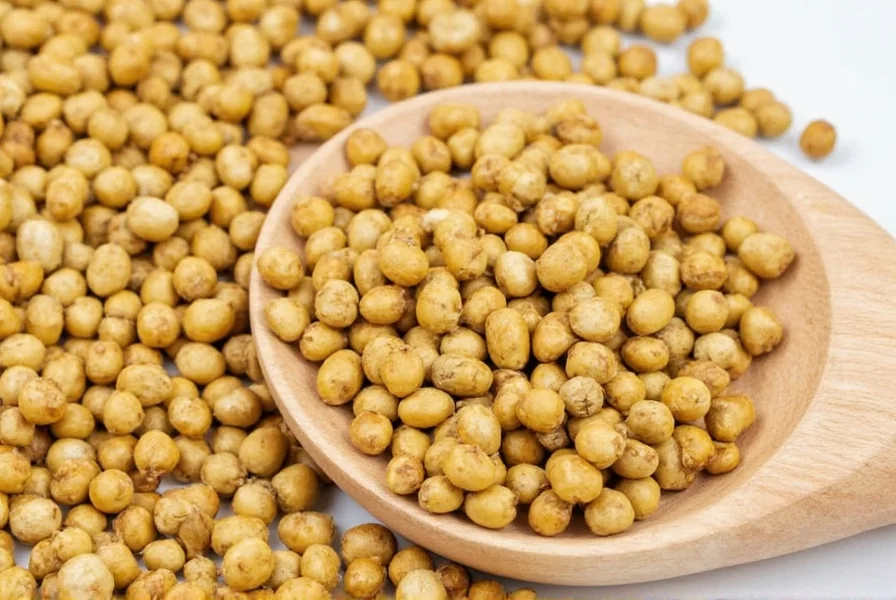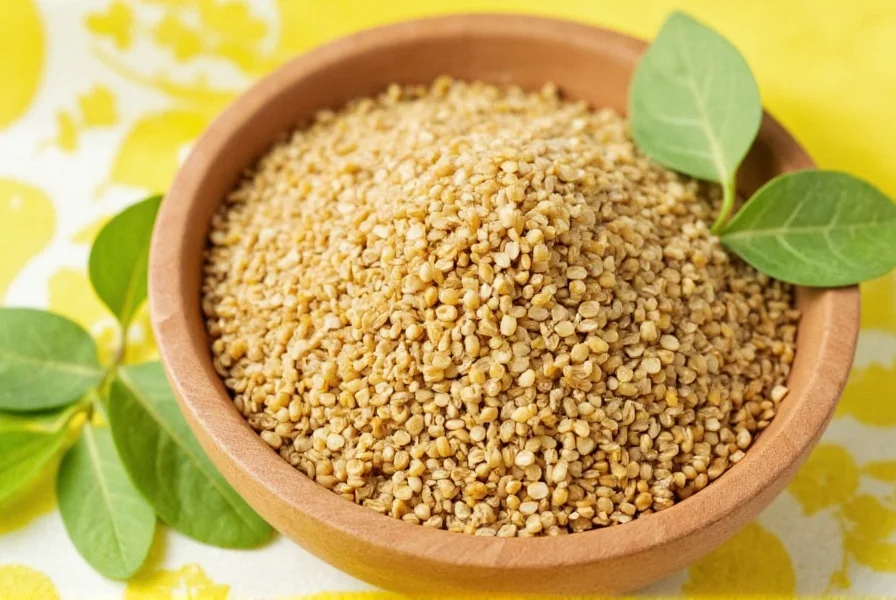Fenugreek (Trigonella foenum-graecum) has been used for centuries in traditional medicine and culinary applications, particularly in Mediterranean, Indian, and Middle Eastern cultures. This versatile herb offers impressive nutritional benefits whether consumed as seeds, leaves, or supplements. Understanding fenugreek nutrition helps consumers make informed decisions about incorporating this powerful plant into their diets.
Nutritional Composition of Fenugreek Seeds
Fenugreek seeds are nutritional powerhouses packed with essential vitamins, minerals, and bioactive compounds. The nutritional profile varies slightly depending on whether you're consuming whole seeds, ground powder, or fresh leaves, but the seeds contain the most concentrated nutrients.
| Nutrient | Amount per 100g | % Daily Value |
|---|---|---|
| Calories | 323 kcal | 16% |
| Protein | 23 g | 46% |
| Dietary Fiber | 24.6 g | 87% |
| Iron | 33.5 mg | 186% |
| Magnesium | 191 mg | 45% |
| Manganese | 1.23 mg | 53% |
Key Nutrients and Their Health Benefits
The exceptional fenugreek nutritional composition contributes to several evidence-backed health benefits. Unlike many herbs that offer minimal nutritional value, fenugreek delivers substantial amounts of essential nutrients that support various bodily functions.
Protein and Fiber Content
Fenugreek seeds contain approximately 23g of protein per 100g, making them an excellent plant-based protein source, particularly valuable for vegetarian and vegan diets. The high fiber content (24.6g per 100g) supports digestive health and helps regulate blood sugar levels. This impressive fenugreek seed nutritional value makes it particularly beneficial for individuals managing diabetes.
Mineral Profile
Fenugreek's mineral content stands out among culinary herbs. With 33.5mg of iron per 100g (186% of daily value), it's an exceptional plant-based iron source, though the non-heme iron has lower bioavailability than animal sources. The substantial magnesium content (191mg) supports muscle function and energy production, while the manganese contributes to bone health and metabolic processes.
Bioactive Compounds
Beyond basic nutrition, fenugreek contains unique compounds that contribute to its health effects:
- Diosgenin - A compound used in steroid production with potential anti-cancer properties
- 4-hydroxyisoleucine - An amino acid that may improve insulin function
- Fenugreekine - An alkaloid with potential cholesterol-lowering effects
- Galactomannan - A soluble fiber that supports digestive health
Fenugreek Leaves Nutrition Facts
While seeds contain the most concentrated nutrients, fresh fenugreek leaves (known as methi in Indian cuisine) offer their own nutritional benefits. Per 100g, fresh leaves contain:
- Calories: 49 kcal
- Protein: 2.5 g
- Fiber: 2.7 g
- Vitamin A: 6200 IU (124% DV)
- Vitamin C: 3 mg (5% DV)
- Calcium: 176 mg (18% DV)
- Iron: 3.1 mg (17% DV)
Fresh leaves provide significant vitamin A and calcium, making them valuable additions to salads and cooked dishes. Understanding fenugreek leaves nutrition facts helps consumers maximize the herb's benefits through dietary variety.
Scientific Evidence for Health Benefits
Research supports several health benefits associated with fenugreek consumption, particularly related to its nutritional composition:
Blood Sugar Regulation
Multiple studies demonstrate fenugreek's potential for blood sugar control. A 2019 meta-analysis published in Nutrition Reviews found that fenugreek supplementation significantly reduced fasting blood glucose levels. The fiber content and 4-hydroxyisoleucine compound appear responsible for this effect, making fenugreek nutrition particularly relevant for diabetes management.
Lactation Support
Fenugreek has traditional use for increasing milk production in breastfeeding women. Research suggests the diosgenin content may stimulate milk production. A 2018 study in the Journal of Alternative and Complementary Medicine found women taking fenugreek supplements produced significantly more breast milk than the control group.
Digestive Health
The high fiber content in fenugreek seeds supports digestive health by promoting regular bowel movements and feeding beneficial gut bacteria. Traditional medicine has long used fenugreek for digestive issues, and modern research supports its mucilage content soothing the digestive tract.
How to Incorporate Fenugreek for Maximum Nutrition
To benefit from fenugreek nutritional composition, consider these practical approaches:
Using Whole Seeds
Soak 1-2 teaspoons of fenugreek seeds overnight, then consume them in the morning. This traditional method increases nutrient bioavailability and makes the seeds easier to digest. The soaked seeds can also be added to salads or smoothies for fenugreek nutritional benefits without the characteristic bitter taste.

Culinary Applications
Dry roast fenugreek seeds briefly to reduce bitterness before using in curries, pickles, or spice blends. Fresh fenugreek leaves work well in parathas, dals, and vegetable dishes. For those wondering how much fenugreek should I consume daily, culinary use typically involves 1-2 teaspoons of seeds or a handful of fresh leaves per serving.
Supplementation
Fenugreek supplements typically provide 500-600mg capsules. Research on fenugreek for blood sugar control often uses doses of 1-2g daily. Always consult with a healthcare provider before starting supplementation, especially if you have medical conditions or take medications.
Safety Considerations and Potential Side Effects
Fenugreek is generally safe when consumed in food amounts, but higher doses may cause:
- Digestive discomfort (gas, bloating)
- Maple syrup-like body odor (due to sotolone compound)
- Potential interactions with diabetes medications
- Uterine stimulation (avoid during pregnancy)
Individuals with peanut or chickpea allergies should exercise caution as fenugreek belongs to the same plant family. When considering is fenugreek good for digestion, note that while it generally supports digestive health, excessive consumption may cause gastrointestinal distress in some individuals.

Conclusion
Fenugreek offers an impressive nutritional profile that extends beyond basic vitamin and mineral content. Its unique combination of protein, fiber, minerals, and bioactive compounds makes it a valuable addition to a balanced diet. Whether you're interested in fenugreek nutritional composition per 100g for dietary planning or seeking natural approaches to support blood sugar regulation and lactation, this ancient herb provides science-backed benefits. As with any dietary change, incorporate fenugreek gradually and consult healthcare professionals when using it for specific health concerns.
Frequently Asked Questions
What are the key nutritional benefits of fenugreek seeds?
Fenugreek seeds provide exceptional nutritional value with 23g protein, 24.6g fiber, and significant amounts of iron (33.5mg), magnesium (191mg), and manganese (1.23mg) per 100g. They also contain unique bioactive compounds like diosgenin and 4-hydroxyisoleucine that support blood sugar regulation and lactation.
How does fenugreek help with blood sugar control?
Fenugreek supports blood sugar regulation through multiple mechanisms: its high fiber content slows carbohydrate absorption, the amino acid 4-hydroxyisoleucine improves insulin function, and galactomannan fiber helps moderate glucose metabolism. Research shows fenugreek supplementation can significantly reduce fasting blood glucose levels.
What's the recommended daily amount of fenugreek?
For culinary use, 1-2 teaspoons of seeds or a handful of fresh leaves daily provides nutritional benefits without side effects. Therapeutic doses for specific conditions like blood sugar management typically range from 1-2 grams daily, often in supplement form. Always consult a healthcare provider before using therapeutic doses.
Can fenugreek leaves provide similar nutritional benefits as the seeds?
While fenugreek leaves offer different nutritional benefits than seeds, they're valuable additions to your diet. Fresh leaves provide significant vitamin A (6200 IU per 100g), calcium (176mg), and iron (3.1mg), making them excellent for bone health and vision. However, they contain less protein and fiber than the seeds, so consuming both forms maximizes nutritional benefits.
Are there any safety concerns with consuming fenugreek?
Fenugreek is generally safe in food amounts but may cause digestive discomfort or a maple syrup-like body odor at higher doses. It can interact with diabetes medications, potentially causing hypoglycemia. Pregnant women should avoid therapeutic doses as fenugreek may stimulate uterine contractions. Those with peanut allergies should exercise caution due to potential cross-reactivity.











 浙公网安备
33010002000092号
浙公网安备
33010002000092号 浙B2-20120091-4
浙B2-20120091-4